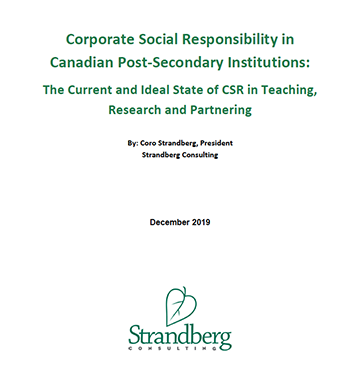“Corporate Social Responsibility in Canadian Post-Secondary Institutions: The Current and Ideal State of CSR in Teaching, Research and Partnering” was commissioned by the federal government to understand the current and ideal state of Corporate Social Responsibility (CSR) in teaching, research and partnering within Canadian post-secondary institutions, and identify potential roles the federal government could play to accelerate and advance CSR in Canada.
The federal government interviewed representatives from 17 “CSR” institutes, programs and centres of excellence at post-secondary institutions across Canada in the winter of 2019. Strandberg summarized and analyzed the interviews to produce the report “Corporate Social Responsibility in Canadian Post-Secondary Institutions: The Current and Ideal State of CSR in Teaching, Research and Partnering”.
The report found that while all institutions offer mandatory or elective CSR education, few believe CSR is fully integrated into the academic curriculum. As a result, most students are not exposed to CSR in their education. Barriers to integrating CSR in the curriculum include a lack of support and incentives from senior administration, and the lack of demand from accreditation bodies and employers. Equally, interviewees believe CSR should be embedded in continuing and executive education as professionals did not receive this education in their early degrees. However, this is not routinely included in these offerings, due again to the lack of market demand and absence of institutional funding and support.
“Corporate Social Responsibility in Canadian Post-Secondary Institutions: The Current and Ideal State of CSR in Teaching, Research and Partnering” found that all institutions partner with their communities to varying degrees from ad hoc participation on expert panels to ongoing sustained collaboration on societal issues with multi-stakeholders. According to interviewees, to accelerate the private sector’s participation in effective CSR, advanced education institutions should contribute holistically, including through teaching, research, collaboration, thought leadership, acting as CSR actors themselves in terms of their operations, and bringing all their assets to contribute to social outcomes in partnership with business, government and civil society.
Within the report “Corporate Social Responsibility in Canadian Post-Secondary Institutions: The Current and Ideal State of CSR in Teaching, Research and Partnering” interviewees identify several roles for the federal government to help their institutions improve CSR performance in Canada.
